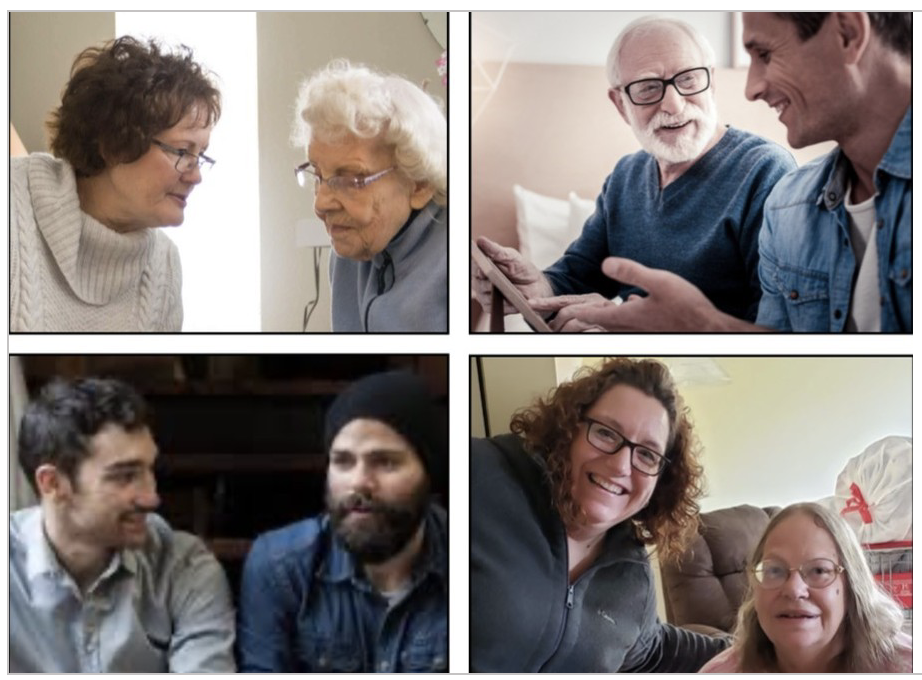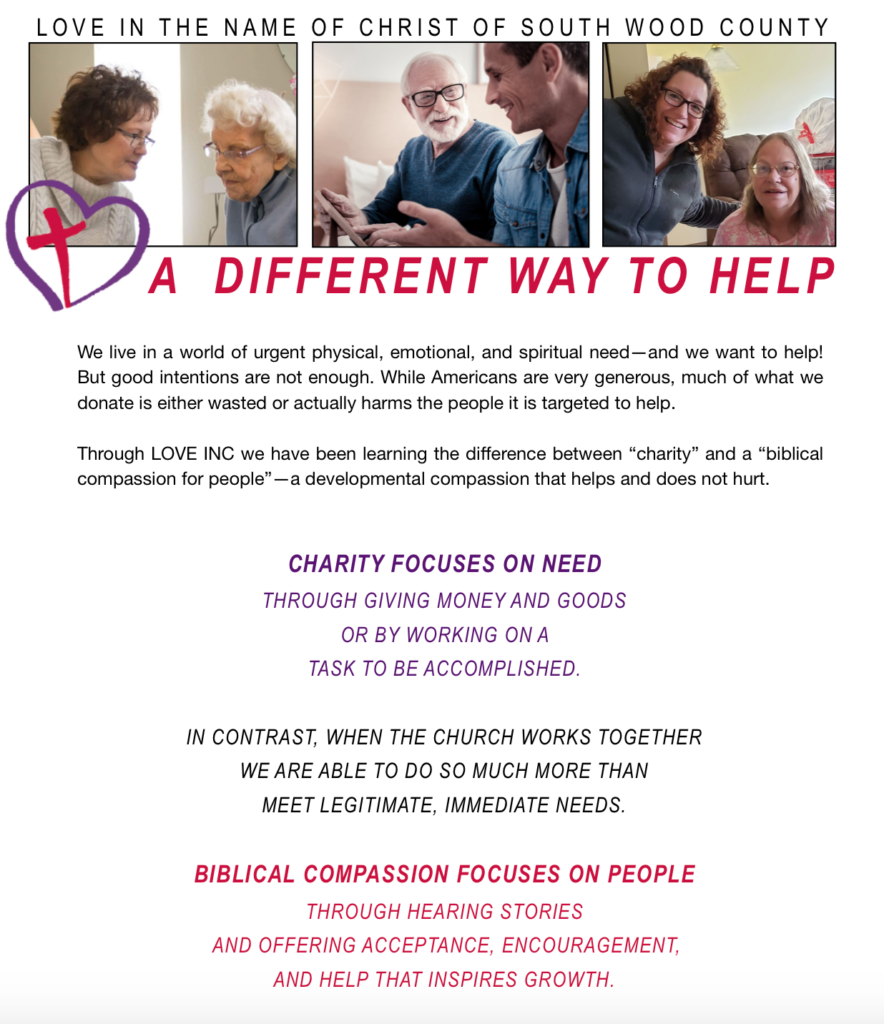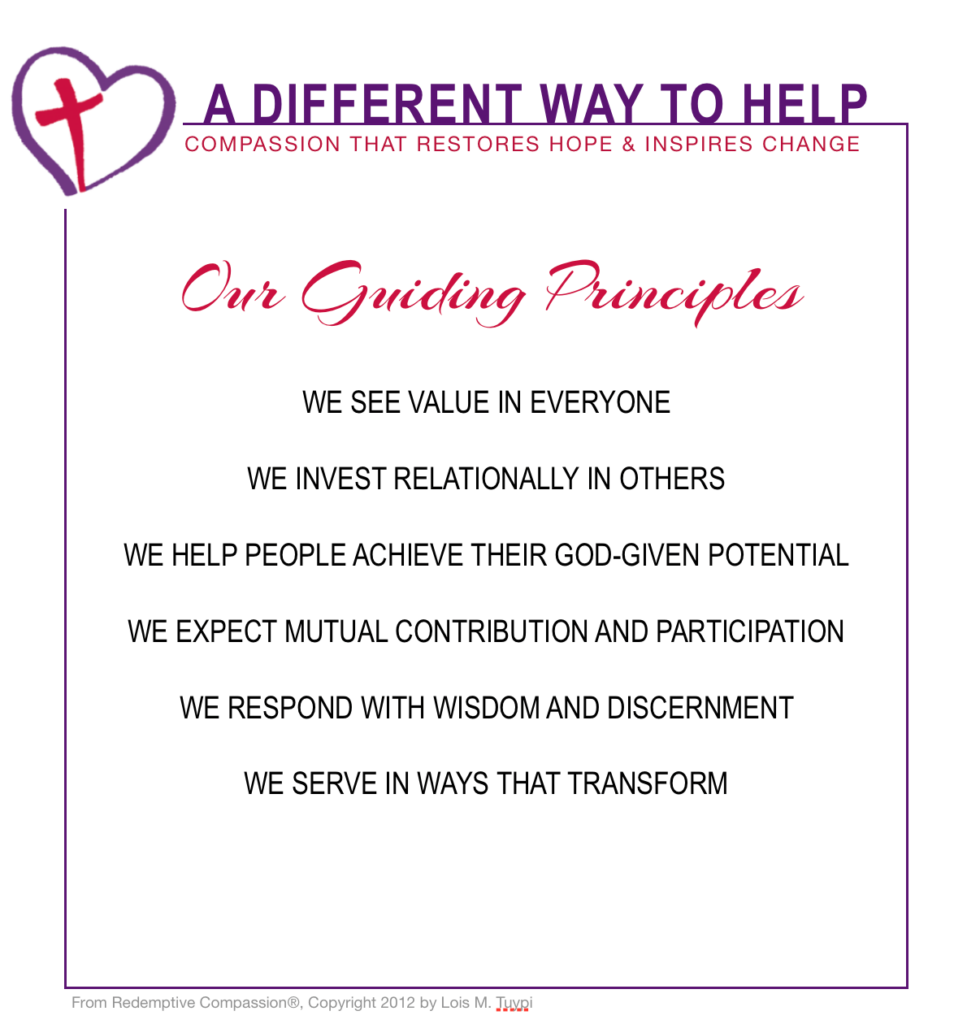A Different Way to Help — 2: Exploring Solutions

In Part 1: The Dilemma, I concluded that Christians often address needs in a way that leaves people stuck in a chronic cycle of defeat. The problems are complex, and the solutions are not simple or easy. My desire is to invite fellow Christ-followers into a conversation to explore solutions to the dilemma.
What might we do differently to effectively help neighbors in need?
As a volunteer with Love In the Name of Christ of South Wood County, I have been learning so much! My thinking has been challenged, and I’ve realized there are two basic ways to start the “helping process.” One focuses on the NEED, while the other focuses on the PERSON. My mind is slowly grasping the difference between “charity” and “true biblical compassion.”
Here is a one-page flyer I created with a simple explanation of the core differences between charity and biblical compassion that offers wholistic help:

Charity focuses on NEED. Biblical Compassion focuses on PEOPLE. It’s a shift in thinking. Biblical Compassion offers wholistic help—meeting emotional, spiritual, and relational needs as well as physical needs. Through biblical compassion we listen well; we hear personal stories. We offer acceptance, encouragement, and help that awakens hope and invites people to grow and change.
Of course, Biblical Compassion often meets a legitimate immediate need, but it moves beyond charity. How we diagnose the problem of poverty directly impacts how we will seek to address it. If we treat only the symptoms, or if we misdiagnose the underlying problem, we will not improve the situation—and we might actually make the lives of the materially poor worse in the long run. For example, if we only hand people food or supplies week after week, it can establish a cycle of need. But if we take the time to listen well, we often discover the root—the real reason they need food each week. Addressing the root cause will be as unique as each individual. Perhaps one person needs help to find a suitable job. Another person may need a mentor to help with grocery shopping to make their dollars stretch. And another may need a class on finances, or an ally to help them with money management. As we build relationships with people, we can begin to assess and work toward meeting their deeper needs. We move from a “hand-out mentality” to a “hand-up ministry.”
Giving a hand-out is relatively easy and can “make us feel good.” But it’s not about us “feeling good,” is it? We are called to serve people well, and it starts with changing our thinking about what that means. Learning to serve in a different way takes a little time and effort on our part. Training is necessary so that we don’t inadvertently hurt someone in our effort to help them. Love In the Name of Christ has a track record of excellence in training people to offer wholistic help. The trainings offered through Love INC have stretched my thinking and given me hope that the church can have a transforming impact on the people we serve.
One of the first things I learned through training were Love INC’s wonderful guiding principles. Being guided by these principles keeps us focused on serving in ways that help and do not hurt.

As we follow LOVE INC principles, it impacts us just as much as it impacts those we serve! God desires to see each of us grow from the inside out, both the helper and the one being helped. We learn to search our hearts and clarify our personal desire in serving. Then we take steps to live it out.
Love INC volunteers desire to:
IMPROVE LIFE – Not sustain a lifestyle need
BUILD PEOPLE UP – Not tear them down
EMPOWER – Not demoralize & devalue them
INVOLVE – Not exclude
TEACH – Not hinder them by doing it for them
OFFER HOPE – Not further a sense of hopelessness
INCREASE SELF-WORTH – Not substantiate their lack of worth
UNITE – Not Segregate
Identifying our motives and inward desire is the first step to serving well. Learning to make that desire a reality, however, takes some time and effort on our part. Love INC volunteers receive insightful and practical training that allows them to help people in ways that free them instead of keeping them trapped—in ways that build them up and move them forward in life, meeting emotional, spiritual, relational, and physical needs.
One of my favorite trainings is a workshop called Redemptive Compassion, written by Lois M. Tuypi. Taking the workshop is a wonderful step in learning a different way to help. Here’s what a Love INC volunteer had to say after taking the workshop:
“Redemptive Compassion is a means to help a neighbor who might need guidance more than a hand-out. It involves a relational investment in time to help the neighbor stand on their own two feet and gain self-esteem in the process. To learn more about this unique approach to helping our neighbors, I would highly recommend attending a class on Redemptive Compassion.” Lottie McDermott
Volunteers like Lottie are now experiencing the joy of walking along-side a neighbor in need, providing emotional, spiritual, or relational help in time of need.
“There has never been a time in history like this! Government and community resources are stretched to the limit and the family unit is falling apart. It’s an unbelievable opportunity for the church—we can be a catalyst for change in our community if we unite and commit to helping people in a way that truly helps and does not hurt.”
Lois M. TUYPI
So what about you? Would you like to learn more?
Check out the resources below or contact Love INC of South Wood County for more information. Email: [email protected], or Call: 715.424.LOVE (5683)
INFORMATION & RESOURCES
ATTEND A ONE-HOUR INFORMATIONAL SESSION
Each month, Love INC offers a one-hour session to introduce people to Love In the Name of Christ of South Wood County. Click to download the 2021 dates, or call for more information. Call: 715.424.LOVE (5683)
TAKE A WORKSHOP
Love In the Name of Christ offers a workshop called Redemptive Compassion that is the perfect first step in understanding a different way to help. Contact Love INC to sign up for a Redemptive Compassion Workshop or to learn more. Call: 715.424.LOVE (5683)
BOOKS
When Helping Hurts — How to Alleviate Poverty Without Hurting the Poor . . Or Yourself [Steve Corbett, Brian Fikkert]
Toxic Charity — How Churches and Charities Hurt Those They Help, And How to Reverse It [Robert D. Lupton]
Compassion with Redemptive Power [Lois M. Tuypi]
Redemptive Compassion — A Study Guide [Lois M. Tuypi] [Can be used individually or with a small group]
SMALL GROUP STUDY
When Helping Hurts Small Group Study Guide and free videos to jumpstart conversation [Brian Fikkert]
ONE-PAGE DESCRIPTION
Click to download the one-page graphic that explains the difference between charity and biblical compassion.
___________________________________________________________
By Diane O’Connor, Volunteer
Love In the Name of Christ of South Wood County
Diane is the designer of Leader to Leader,™ a framework, philosophy, and strategy for leadership development. A volunteer with Love In the Name of Christ of South Wood County, she loves coaching high-end leaders, helping them to clarify their vision and build strong teams.

